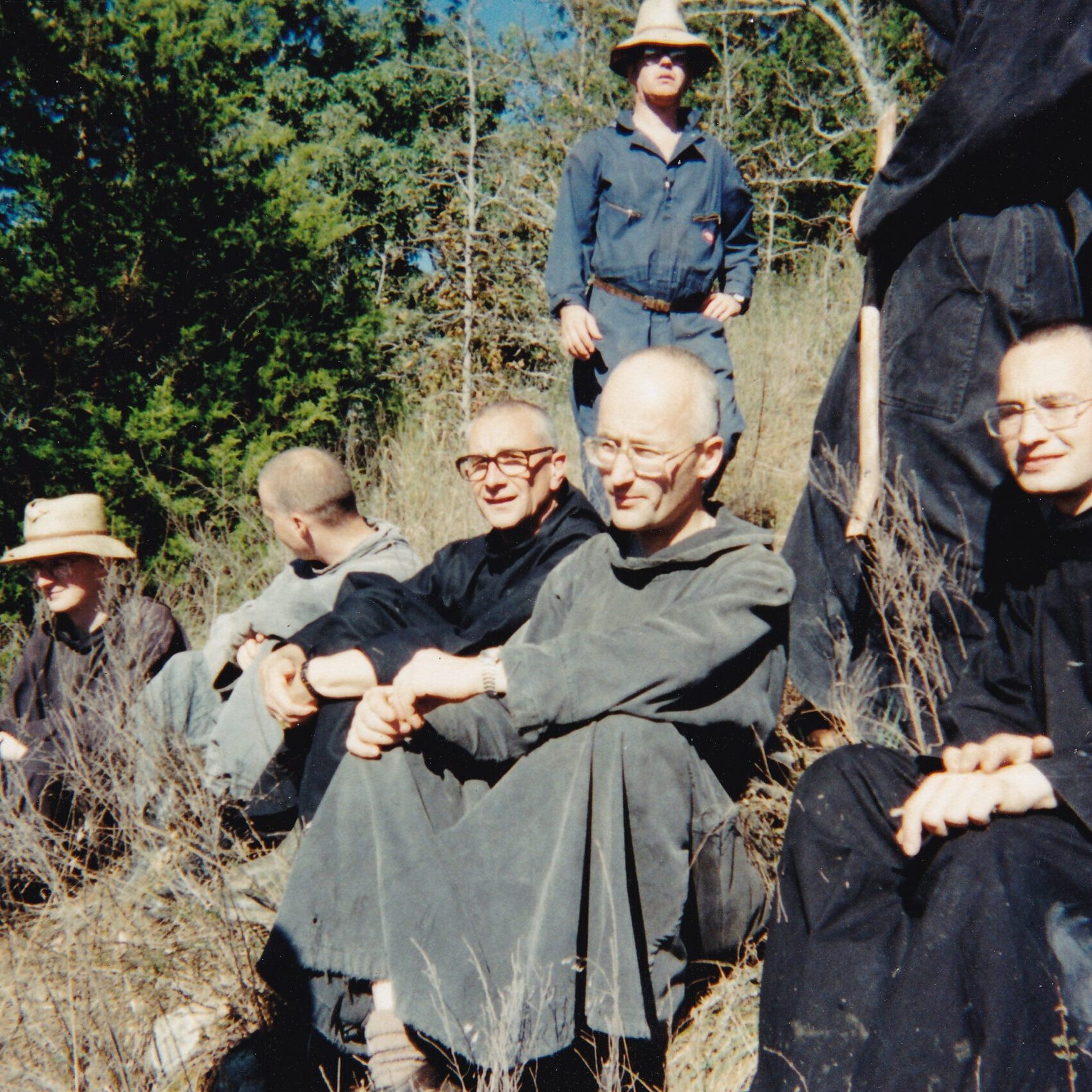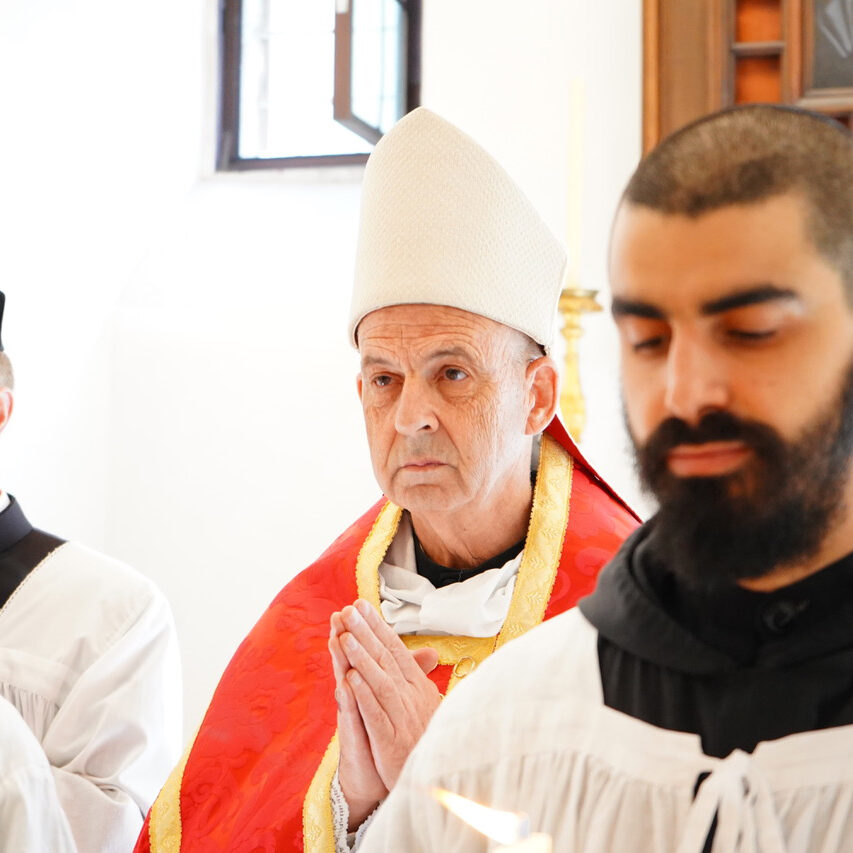Dear Friend of Clear Creek Abbey,
While I write this letter America is struggling—once again—to come to grips with the unspeakable horror of a mass shooting, perpetrated this time on Ash Wednesday, which was also St. Valentine’s Day this year. Even monks behind their cloister walls cannot entirely escape the effects of such a tragedy, one that plunges a whole people into sadness and renews the sense of desperation that gnaws at our society as the all-too-familiar scenario unfolds.
For the better-informed Christian, this recent killing is not very surprising. When a society loses touch with the well-springs of authentic culture and thrives instead on the pride of its technology and the promise of ever more individualistic freedoms and pleasures, there is danger lurking at the door—a “culture of death.” Sadly, too many citizens have yet to awaken to the simple fact that when faith becomes weak and truth a mere relative notion—when we lose our spiritual bearings and even our very soul—peace and social sanity cannot be maintained. So where does that leave us?
As a monk I shall not try to offer practical advice (or a behavioral algorithm) addressing the multifaceted challenge that our country faces in the wake of Parkland—others will have done this. But I do know a spiritual recipe that will nourish any human being in search of peace, a state of mind that can combat the appalling and useless violence that has destroyed so many lives. In fact, this recipe, useful for our spiritual growth and for fundamental human sanity, goes well with the season of Lent we are living. (Men who, like me, do not cook need not worry, as this recipe works as well for soldiers or workers in the field as for the wife in a well-ordered household.) Here it is.
1. Clear the table, collecting all “how to” books about the spiritual life and all “selfhelp” guides to happiness, placing them in a box to be kept out in the garage to be burned later.
2. Pour three full cups of authentic liturgical life into the baking dish of daily life. The Sacraments celebrated in the liturgy, beginning with Holy Baptism, are the basic elements here, notably the Holy Eucharist, the Holy Sacrifice of Mass, celebrated with a deep sense of adoration. If you fail the rest of the recipe, this alone could suffice. When at all possible, this must be accomplished every day or several times per week. Let simmer, stirring occasionally over the fire of the Holy Spirit.
3. Add one cup of authentic lectio divina, or meditative study of Holy Scripture, along with the works of canonized Saints such as St. Basil or St. Benedict (as in “eggs Benedict”). A small amount of this lectio is sufficient for those who have active lives, but it must be done regularly. A considerable effort may be required to find the place and time, but this is essential to the recipe.
4. Add one full measure of personal prayer, especially the Holy Rosary.
5. Then add two cloves (crushed) of some sort of work with one’s hands—“manual labor” as St. Benedict refers to it. Pilgrimages on foot can also be substituted for this ingredient.
6. Finally, one teaspoon of humor. This might come with reading a bit of G. K. Chesterton or some other holy humorist (there are not many in the world). This is necessary so as not to take oneself too seriously—something that will spoil the whole recipe.
7. Bake for the rest of your life as needed.
Other ingredients can be added to the recipe, such as Eucharistic Adoration and various approved devotions, including the Divine Mercy Chaplet, of course.
Nutrition Facts:
Per serving this food (especially Holy Communion) unites the soul and the whole human being to God more each day. This spiritual nourishment helps us enter into that silent center of our heart where God is present in the depths. From this nourished silence, under the action of Divine grace and the virtues of Faith, Hope, and Charity, blossoms forth true contemplation, which will carry us like the Prophet Elijah through the forty days’ march (Lent) in the desert all the way to the Mountain of God. It will also carry us through the larger desert of this world to the blessed precincts of the Heavenly Jerusalem, locus of the very beatifying love and knowledge of God that is our supernatural food for all eternity.
+ br. Philip Anderson, abbot
Dear Friend of Clear Creek Abbey,
While I write this letter America is struggling—once again—to come to grips with the unspeakable horror of a mass shooting, perpetrated this time on Ash Wednesday, which was also St. Valentine’s Day this year. Even monks behind their cloister walls cannot entirely escape the effects of such a tragedy, one that plunges a whole people into sadness and renews the sense of desperation that gnaws at our society as the all-too-familiar scenario unfolds.
For the better-informed Christian, this recent killing is not very surprising. When a society loses touch with the well-springs of authentic culture and thrives instead on the pride of its technology and the promise of ever more individualistic freedoms and pleasures, there is danger lurking at the door—a “culture of death.” Sadly, too many citizens have yet to awaken to the simple fact that when faith becomes weak and truth a mere relative notion—when we lose our spiritual bearings and even our very soul—peace and social sanity cannot be maintained. So where does that leave us?
As a monk I shall not try to offer practical advice (or a behavioral algorithm) addressing the multifaceted challenge that our country faces in the wake of Parkland—others will have done this. But I do know a spiritual recipe that will nourish any human being in search of peace, a state of mind that can combat the appalling and useless violence that has destroyed so many lives. In fact, this recipe, useful for our spiritual growth and for fundamental human sanity, goes well with the season of Lent we are living. (Men who, like me, do not cook need not worry, as this recipe works as well for soldiers or workers in the field as for the wife in a well-ordered household.) Here it is.
1. Clear the table, collecting all “how to” books about the spiritual life and all “selfhelp” guides to happiness, placing them in a box to be kept out in the garage to be burned later.
2. Pour three full cups of authentic liturgical life into the baking dish of daily life. The Sacraments celebrated in the liturgy, beginning with Holy Baptism, are the basic elements here, notably the Holy Eucharist, the Holy Sacrifice of Mass, celebrated with a deep sense of adoration. If you fail the rest of the recipe, this alone could suffice. When at all possible, this must be accomplished every day or several times per week. Let simmer, stirring occasionally over the fire of the Holy Spirit.
3. Add one cup of authentic lectio divina, or meditative study of Holy Scripture, along with the works of canonized Saints such as St. Basil or St. Benedict (as in “eggs Benedict”). A small amount of this lectio is sufficient for those who have active lives, but it must be done regularly. A considerable effort may be required to find the place and time, but this is essential to the recipe.
4. Add one full measure of personal prayer, especially the Holy Rosary.
5. Then add two cloves (crushed) of some sort of work with one’s hands—“manual labor” as St. Benedict refers to it. Pilgrimages on foot can also be substituted for this ingredient.
6. Finally, one teaspoon of humor. This might come with reading a bit of G. K. Chesterton or some other holy humorist (there are not many in the world). This is necessary so as not to take oneself too seriously—something that will spoil the whole recipe.
7. Bake for the rest of your life as needed.
Other ingredients can be added to the recipe, such as Eucharistic Adoration and various approved devotions, including the Divine Mercy Chaplet, of course.
Nutrition Facts:
Per serving this food (especially Holy Communion) unites the soul and the whole human being to God more each day. This spiritual nourishment helps us enter into that silent center of our heart where God is present in the depths. From this nourished silence, under the action of Divine grace and the virtues of Faith, Hope, and Charity, blossoms forth true contemplation, which will carry us like the Prophet Elijah through the forty days’ march (Lent) in the desert all the way to the Mountain of God. It will also carry us through the larger desert of this world to the blessed precincts of the Heavenly Jerusalem, locus of the very beatifying love and knowledge of God that is our supernatural food for all eternity.
+ br. Philip Anderson, abbot






